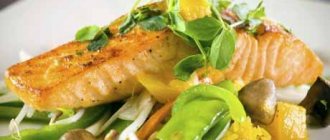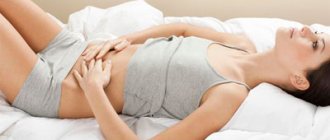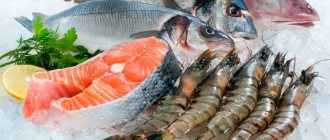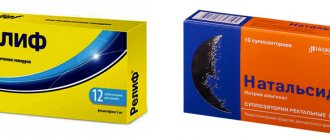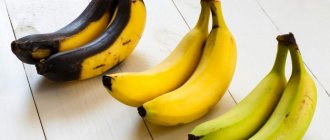Hemorrhoids are varicose veins around the rectum. Depending on location, extended formations are divided into internal and external. They are manifested by itching in the rectal area, painful bleeding fissures, pain during bowel movements, severe discomfort when sitting, and everyday activities. The basis of treatment is visiting a doctor, assessing the condition, and adjusting the diet. It is the diet for hemorrhoids that fundamentally influences the treatment of the disease and the subsequent prevention of complications.
Why is diet important in the treatment of hemorrhoids?
Poor nutrition can cause blood flow to the pelvic area, which can lead to a number of complications, including:
- rupture of sutures, healing tissues (after surgery);
- bleeding from damaged areas;
- development of infection.
Problems with emptying (constipation, diarrhea) also negatively affect the mucous membrane of the lower gastrointestinal tract and delay recovery time. Following the rules of the diet for hemorrhoids will help prevent them.
How to treat hemorrhoids?
Treatment of this disease should be carried out only after consultation with a qualified specialist. Self-medication or using so-called “folk remedies” is highly discouraged, since in its advanced form the disease tends to progress very quickly.
Depending on the stage of the disease, the doctor may prescribe different treatment options:
- First stage. The main goals are to eliminate pain and stop the inflammation process. The patient should take a course of medications (Proctosedyl, Anuzol and others), use rectal suppositories and ointments. As a result, the wall of the rectum should relax and normal blood circulation will be restored;
- Second stage. In addition to medications and ointments, the patient needs to undergo a whole range of medical procedures. Among them is sclerotherapy (a special medicine is injected into the anus, which initially glues the walls together, but after a while quickly dissolves); ligation (a painful knot is tightened with a latex thread, which then falls out on its own); infrared coagulation (thermal effects on painful areas).
- Third stage. Medicines play a passive role in treatment. Treatment is carried out only by the surgical method: disarterization (blocking blood access to the nodes); hemorrhoidectomy (direct removal of hemorrhoids);
- Fourth stage. It can only be treated with surgery: coagulation or radio wave surgery.
Principles of diet for patients with hemorrhoids
The development of hemorrhoids is supported by prolonged constipation, inflammation in the rectum, and insufficient blood circulation in the lower part of the body caused by a sedentary lifestyle. The disease can also develop during pregnancy.
Nutrition adjustments
For mild hemorrhoids, the diet is based on increasing fiber consumption, i.e. including more fruits, vegetables, and whole grain products in the diet. The following products have a therapeutic effect on the symptoms of the disease:
- legumes (especially soybeans, soy products);
- oatmeal;
- tomatoes;
- cucumbers;
- melon;
- sauerkraut;
- black currant;
- citrus fruits;
- figs
Buckwheat is known for containing a medicinal bioflavonoid - rutin. This is a substance that prevents the development of hemorrhoids. Research confirms that regular consumption of buckwheat (at least 3 times a week) along with flaxseed decoction and increased fiber intake can not only alleviate problems, but also cure the disease within a month.
Avoiding spicy foods
A diet for hemorrhoids involves excluding from the menu hot, spicy foods that cause irritation of the rectal mucosa. Such food aggravates the disease and increases pain during bowel movements.
Adequate fluid
When following a diet at home (during exacerbation of hemorrhoids, chronic course of the disease), sufficient fluid intake is important. Drinking softens the stool, preventing severe muscle tension that leads to complications. Beware of drinks containing caffeine (coffee, chocolate, cocoa) - they can cause itching and burning.
The best liquid is plain water, unsweetened tea. It is recommended to drink 2-3 liters of these liquids per day. They support digestion and therefore help improve the breakdown of food in the stomach. It enters the intestines in a more acceptable state, reducing the risk of damage to the intestinal wall and irritation of internal hemorrhoids.
Vitamins
When following a diet for hemorrhoids, provide the body with sufficient doses of vitamin C, preferably in its natural form. This vitamin strengthens the walls of blood vessels.
Vitamin E, in turn, improves blood circulation.
Causes of the disease
There may be a hereditary predisposition to hemorrhoids, which, however, never plays a decisive role in the development of this disease. This is due to one of the following reasons:
- Improper diet (primarily abuse of spicy foods);
- Sedentary work and a general lack of physical activity;
- On the contrary, too much stress - both in sports and at work;
- Constipation;
- Anal sex;
- Advanced process of inflammation in the intestines;
- Infection brought into the intestine;
- Pregnancy and childbirth;
- Overexertion when sitting on the toilet.
As a result of the action of one of the listed factors, blood begins to accumulate in the pelvic area. Over time, it stagnates and hemorrhoids form.
With age (after forty years), the likelihood of developing hemorrhoids increases. Bad habits, stress and emotional stress also play a role.
How to create the right menu for hemorrhoids?
A diet for hemorrhoids for every day is a balanced menu with a high fiber content, sufficient drinking regimen, physical activity, and correction of body weight.
Useful foods for hemorrhoids
Nutrition provides not only relief from the symptoms of the disease, but also speeds up its treatment. But it is important to know and follow the rules of the diet for hemorrhoids: what you can and cannot consume, how to prepare food.
Suitable Products:
- whole grains;
- legumes;
- vegetables;
- fruits;
- cereals: rice, buckwheat, millet;
- sheep and goat cheeses;
- Sesame oil;
- peanut butter;
- soybeans, its products: tofu, soy milk, etc.;
- seitan wheat meat;
- bird;
- fish;
- flax-seed;
- sesame, sunflower, pumpkin seeds;
- 100% juices, herbal teas (plantain, thyme, fennel, anise, star anise, ginger).
Cellulose
Fiber supports intestinal activity, improves its functioning and absorption of nutrients. But its excessive consumption can cause intestinal problems and impaired bowel movements.
What foods contain fiber:
- whole grain products;
- fruits;
- vegetables.
Vegetables to soften stool
Especially in the summer, when the disease often worsens, it is recommended to enrich daily diet recipes for hemorrhoids (for men and women) with seasonal vegetables, which alleviate the condition of patients.
Vegetables with a high water content are suitable, which, together with fiber, helps soften the stool. These include:
- cucumbers;
- zucchini;
- eggplant;
- pumpkin;
- tomatoes;
- squash;
- melon;
- watermelon (although it is a berry);
- beets;
- radish;
- carrot;
- cabbage
Fruits to replenish important nutrients
The following fruits and berries are suitable for a diet for hemorrhoids in women and men:
- currant;
- gooseberry;
- blackberry;
- raspberries;
- cherry;
- apples.
They contain flavonoids that strengthen the walls of blood vessels. These beneficial substances are also present in sea buckthorn and rowan. Other fruits are also suitable, especially citrus fruits. They contain 2 main flavonoids - hesperidin and diosmin.
- Hesperidin improves the tone of the vascular wall and improves microcirculation. Because of this property, it is used to treat all manifestations of venous insufficiency, including hemorrhoids, in order to prevent venous thrombosis.
- Diosmin, the second most abundant flavonoid, also increases vascular elasticity and microcirculation. It reduces oxidative stress by protecting capillaries.
Undesirable foods for hemorrhoids
First of all, we are talking about foods rich in fats and proteins. When creating a menu and diet for hemorrhoids every day, this food should be limited. This includes dairy products and meat. White bread is also not recommended. Eliminating drinks containing caffeine and alcohol is a mandatory part of the diet. They negatively affect the functioning of the body as a whole.
Unsuitable food:
- sweets, confectionery;
- a lot of bread and pastries;
- fatty cheeses;
- hard cheeses;
- tropical fruits;
- milk;
- sour cream;
- butter;
- smoked meats;
- smoked cheeses;
- pork;
- eggs;
- artificial sweeteners.
Prohibited foods include hardened fats and oils.
Product combination
Regardless of what diet is prescribed for hemorrhoids (postoperative, against constipation, etc.), it is recommended not to mix cereals and fruits; only bananas and raisins can be added to cereals. It is best to consume dairy products as a monofood, do not eat fruits in the evening, and do not mix them with vegetables.
Food must contain an alkaline component! Alkaline foods include:
- fruits;
- vegetables;
- yoghurts;
- soy;
- almond;
- potato;
- millet;
- buckwheat
On the contrary, acid-forming products:
- meat;
- eggs;
- cereals;
- nuts;
- cheeses;
- legumes
Recommendations for reducing symptoms of the disease
If a person does not know what should not be eaten if hemorrhoids are present, or what foods can cause an unwanted aggravation, then for such people below are tips on what foods should not be eaten if the patient suspects hemorrhoids.
If there is a predisposition to internal hemorrhoids or a person is afraid of bleeding from the anus, then the following products will have to be removed from the food list:
- All dishes that are prepared from refined grains.
- Food products that have undergone special processing.
- Food containing fatty meat components.
- Don't eat dairy foods.
- Coffee, table salt, any spicy and spicy food.
By consuming products made from refined grains, which do not contain fiber and many nutritional compounds and vitamins necessary for the body, a person becomes defenseless against hemorrhoids, since such dishes remain in the stomach for a long time and are not excreted.
Therefore, people who eat a lot of wheat bread, pies, various sweets, and puff pastry products often suffer from the disease.
Processed foods may pose a risk during acute outbreaks. They contain a lot of salt and various harmful components. Therefore, if you suspect the development of symptoms of the disease, you should not eat frozen semi-finished products, quickly prepared foods, fried foods, or various packaged and processed foods.
Eating such types of food is prohibited, as they are poorly digested by the stomach. Fried foods are usually made with corn, soybean, and other vegetable oils. They can damage the walls of the intestinal tract. Therefore, doctors warn patients about which foods to avoid. Most often you have to give up French fries, pancakes, and fried meat. Table salt can become a dangerous type of food if the disease develops. Large amounts of salt slow down the functioning of the digestive system, so any movements in the intestines can further increase the pain impulse.
Sample menu
An example of a diet menu for hemorrhoids for women and men:
Mon:
- Breakfast: sweet rice porridge.
- Lunch: vegetable salad, whole grain bread.
- Dinner: vegetable soup.
Tue:
- Breakfast: bean paste, bread.
- Lunch: applesauce.
- Dinner: pasta with vegetables.
Wed:
- Breakfast: barley porridge with raisins, flaxseed, sprinkled with carob, fried seeds.
- Lunch: vegetable soup with miso and noodles, soy meat on vegetables with beans, rice with vegetables.
- Dinner: pudding with fruit, millet porridge.
Thu:
- Breakfast: yogurt with cereal, raisins.
- Lunch: Rice balls with seaweed.
- Dinner: banana, puffed rice.
Fri:
- Breakfast: bean paste.
- Lunch: vegetable salad with goat or sheep cheese, bread.
- Dinner: vegetable soup.
Sat:
- Breakfast: sweet rice porridge.
- Lunch: vegetable soup, chicken with vegetables, mushrooms, rice, vegetable salad.
- Dinner: salad of beans, vegetables.
Sun:
- Breakfast: yogurt with cereal, banana.
- Lunch: vegetable soup, fillet baked with vegetables, cheese, potatoes.
- Dinner: vegetable salad.
Snacks suitable for a hemorrhoid diet:
- banana;
- apple;
- rice cakes;
- carrot;
- kohlrabi;
- dried fruits;
- millet;
- puffed rice with yogurt, etc.
Diet for acute hemorrhoids and after surgery
When preparing meals for every day during a diet during exacerbation of hemorrhoids or after surgery, consider the following points.
Prepare porridges that are liquid and viscous. Boil cereals and legumes thoroughly. Some grains can be infused overnight without cooking. The best option is buckwheat, millet. These cereals are the most digestible and nutritious. Rice is also useful, but it must be consumed carefully due to its strengthening effect.
The diet for acute hemorrhoids and in the postoperative period involves cooking meat, steaming fish, boiling, and baking in the oven without using fat.
It is better to cook vegetables in water or steam. When raw, they can irritate surgical or bleeding areas.
Supplement each dish containing animal proteins with a vegetable side dish.
Baking with bran, rich in fiber, is recommended. White bread, a pastry diet for hemorrhoids and fissures, is excluded after surgery due to the content of simple carbohydrates that are undesirable during this period. Black bread causes flatulence, a fermentation process that is undesirable for hemorrhoids.
What can you eat?
Fiber is considered beneficial for hemorrhoids. This substance should make up half of the daily diet. It attracts water molecules, helps soften stool and increase its volume, leading to a gentle cleansing of the intestines. In addition, fiber collects harmful substances from the intestinal environment.
To understand what foods to eat for hemorrhoids, you need to consider them to regulate the activity of intestinal contractions. Their use should facilitate defecation and prevent pain, and prevent damage to the integrity of the rectal mucosa.
Dishes made from minced meat and puree are not recommended, because... they do not stimulate intestinal motility
Daily intake of fermented milk and vegetable oils is considered beneficial. They help facilitate the easy passage of feces.
Useful to use:
- rye, grain products made from wholemeal flour or with bran;
- fresh fermented milk, preferably with the addition of live biocultures (ryazhenka, kefir, low-fat cottage cheese and sour cream, milk, mild cheeses);
- weakly brewed teas, mineral waters;
- dried fruits;
- fresh and boiled vegetables and fruits - beets, broccoli, all types of cabbage, green apples, green peas, celery, turnips, greens are best;
- soups based on vegetable broths or low-fat meat/fish;
- vegetable oils (it is recommended to replace mayonnaise sauces with them when preparing salads);
- low-fat types of meat, fish and game;
- offal;
- cereal dishes and cereal porridges based on them;
- eggs boiled until half cooked;
- honey, jam, syrups;
- appetizers: vegetable-based caviar, unsalted or lightly salted herring.
Frequent consumption of food in small quantities improves the functioning of the intestines, food is better digested
The exact set of products recommended for use should be recommended by a doctor for each specific case.
Principles of diet for constipation and hemorrhoids
Proper function of the digestive tract requires regularity. This applies to meal times, sleep, alternating work and rest, as well as bowel movements. Inappropriate dietary components cause constipation. Risky, in particular, low consumption of foods high in indigestible residues, such as:
- dark baked goods;
- legumes;
- fruits;
- vegetables.
Increased consumption of chocolate products and tea is also undesirable.
Nervous stress, internal conflicts, and an unsuitable environment can also cause constipation in the long term (in combination with other reasons). Lack of physical activity, for example, sedentary work that is not compensated by physical activity, increases the risk of hemorrhoids with constipation. In this case, the disease is often accompanied by weakness of the abdominal muscles and increased accumulation of fat in the body.
Although most people cannot do without laxatives when they have problems with bowel movements, the diet for hemorrhoids and constipation does not recommend using them frequently (sometimes it is advisable to temporarily eliminate these drugs). They can cause the intestinal muscle to weaken. Because of this, the rectum is never filled enough to trigger the natural voiding reflex.
The basis of the diet for hemorrhoids and constipation is the inclusion in the diet of foods with a high content of indigestible residues (fiber). Recommended Products:
- black bread;
- baked goods with added bran or food bran itself (1 tbsp several times a day);
- whole grain baked goods;
- peas;
- lentils;
- soybeans and products thereof;
- beans;
- White cabbage;
- spinach;
- cauliflower;
- broccoli;
- Chinese cabbage;
- tomatoes;
- Bell pepper;
- roots;
- fruits.
The diet for hemorrhoids and constipation also includes foods with a natural laxative effect, for example:
- plums;
- cherries;
- oranges;
- figs;
- grapefruit;
- dates;
- syrups;
- strawberries;
- yoghurts;
- buttermilk;
- kefir;
- acidophilus milk;
- honey;
- rhubarb;
- sour cream;
- nuts;
- pears;
- apricots.
Some mineral waters improve bowel movement, but they belong to the group of laxatives. Therefore, consult your doctor before consuming them. But a glass of laxative mineral water can help in training to have regular bowel movements. Later it is replaced with a glass of drinking water.
Sample menu
Day 1:
- Breakfast: milk, brown bread, jam, orange juice.
- Appetizer No. 1: buttermilk, bread.
- Lunch: pea soup, beef with vegetables, salad.
- Snack No. 2: fresh fruit or compote.
- Dinner: borscht, bread.
Day 2:
- Breakfast: white coffee, black bread, cottage cheese pate, orange juice.
- Appetizer No. 1: cheese, tomatoes, pepper.
- Lunch: potato soup with mushrooms, vegetables, risotto with meat, vegetables, compote.
- Snack No. 2: fermented milk product, bread.
- Dinner: steamed pumpkin, potatoes.
Day 3:
- Breakfast: white coffee, bread with butter, honey.
- Snack #1: Fresh fruit with peel.
- Lunch: lentil soup with vegetables, pasta with beef, salad.
- Snack number 2: kefir, bread.
- Dinner: cabbage soup.
Day 4:
- Breakfast: white coffee, bread and butter, strawberry jam.
- Appetizer No. 1: scrambled eggs with onions, bread.
- Lunch: pearl barley soup with vegetables, meatloaf, potatoes, tomato salad with pepper.
- Snack number 2: yogurt, bread.
- Dinner: baked potatoes with meat, cabbage salad.
Day 5:
- Breakfast: white coffee, bread and butter, raspberry jam.
- Appetizer #1: Bread with bacon, green onions.
- Lunch: bean soup with vegetables, pork, potato dumplings, spinach.
- Snack #2: Fresh unpeeled fruit, whole grain cookies.
- Dinner: chicken, gnocchi, compote.
Prebiotics
Unlike probiotics, these are non-living substances. Chemically, these are carbohydrates that are not absorbed by the human body (for example, inulin). The bacteria present in the large intestine receive energy from them and produce organic acids as a product of biochemical reactions. These acids function as an energy source for the cells of the intestinal wall.
Prebiotics are found in foods, supplements, and often in combination with probiotics. The positive effect of this combination is due to the increased likelihood of positive bacteria surviving in the human gut.
Healthy intestinal microflora is an important point in the diet for internal hemorrhoids. It is necessary for proper digestion of food and easy emptying.
How is digestion and disease development related?
The human intestine is an organ entangled in a dense venous network, which successfully ensures the outflow of blood, which makes metabolic processes in this organ possible.
Over time, due to poor diet and lifestyle, the veins that carry blood away from the intestines begin to expand - this is the first sign of hemorrhoids.
The disease is insidious in that its symptoms are often invisible or ignored by the patient for various reasons, although something needs to be done about the disease the sooner the better.
Hemorrhoids can form for various reasons: a congenital tendency to the disease, poor nutrition, lack of mobility, constant stagnation in the intestines.
Whatever the reason that led to the formation of a hemorrhoid, sooner or later it will become inflamed, which will lead to an exacerbation of the disease. Inflammation usually develops as a result of injury or other factors that can cause irritation.
The foods that the patient eats directly contribute to or prevent the development of hemorrhoids.
The main reason that links diet and hemorrhoids is constipation, which people are prone to if they eat the wrong foods. As a result of constipation, an amount of feces accumulates in the intestine, which not only puts pressure on the intestinal wall, causing even greater stagnation of blood in the nodes, but also injures these nodes, leading to inflammation.
If the diet is chosen correctly, the problem of constipation is resolved quite quickly, and exacerbations occur less frequently.
On the other hand, diarrhea is just as harmful to patients with hemorrhoids as constipation. This is explained by the fact that diarrhea most often indicates the presence of pathogenic flora in the intestine, which will quickly lead to infection of hemorrhoidal cones. Doing something about diarrhea is just as necessary as doing something about constipation.
There are also dishes that themselves irritate the intestines. Spicy foods, marinades, spices, and canned food contain substances, the consumption of which increases inflammation and increases blood flow in the intestines.
In case of acute hemorrhoids, it is necessary to balance the diet so that there is no diarrhea or constipation, which is quite difficult to do, especially if you are not used to it.
Hemorrhoids during pregnancy
Hemorrhoids appear in some women at the end of pregnancy, in anticipation of childbirth. This is due to increased pressure on surrounding tissues, blood vessels, as well as on the inferior vena cava, into which blood flows from the lower extremities. The pressure is caused by the growth of the fetus. High blood pressure is also associated with constipation, which often affects pregnant women.
The hemorrhoid diet for women during pregnancy is based on supporting metabolic rate. If the problem of hemorrhoids was absent before pregnancy or the woman is not prone to this disease, it may disappear after childbirth.
Follow the principles of a varied diet with a balanced amount of proteins, fats, and carbohydrates. Avoid foods high in sugar - they have a lot of calories and zero nutritional value. Pay attention to added sweeteners.
The basis of the menu for hemorrhoids during pregnancy is whole grains, whole grain pasta, rice. For meat, give preference to poultry, lean red meat, and fish. Consume legumes - sources of plant proteins. Use spices in moderation. From dairy products, choose semi-skimmed fermented milk products, yoghurts, and cheeses.
Include plenty of fruits and vegetables in your diet. Don't underestimate your drinking regime. The best drinks are pure still water and unsweetened tea. It is recommended to have a bottle of water with you and drink gradually throughout the day.
Menu for hemorrhoids during pregnancy for 1 day:
- Breakfast: muesli with yogurt, pieces of fruit or a slice of whole grain bread with cottage cheese, vegetables (tomato, cucumber).
- Snack #1: fruit (apple, orange) or vegetable (lettuce, pepper), slice of whole grain bread.
- Lunch: potatoes with turkey meat, vegetable salad.
- Snack No. 2: whole grain bread, low-fat cottage cheese, vegetables.
- Dinner: pasta salad with chicken.
Dishes for the postoperative period
With constant prolapse of hemorrhoids and profuse bleeding that is difficult to stop, leading to anemia, patients are advised to undergo surgery. And also with frequent exacerbations, doctors recommend surgery. After excision of the skin and mucous membrane above the problem node, the node is tightened and crossed. Then the intestinal mucosa is fixed to nearby tissues. Thanks to modern technology, this operation is considered relatively safe and painless.
After the procedure, the doctor must tell the patient what diet to follow for hemorrhoids in order to bring recovery as close as possible. The patient's postoperative diet looks like this:
- on the first day you are only allowed to drink;
- on the second day, porridge, fermented milk products, vegetable soups, and vegetable oil are introduced;
- a week later, the victim’s menu is replenished with stewed vegetables. Steamed cutlets and meatballs, stewed meat and fish are allowed.
In the future, you can eat bread with bran, which promotes digestion. Bananas, apples, cherries, kiwis, and dried fruits are safe fruits, but in limited quantities, since excessive consumption can cause bloating. The doctor may prescribe medications to the patient that improve peristalsis, relieve the symptoms of hemorrhoids, and make the stool softer (Mukofalk, Fitomucil).
The postoperative diet for hemorrhoids in women and men involves split meals. You should eat a little food every 2-3 hours. To avoid irritating the wounds, exclude for a while:
- foods that cause flatulence (legumes);
- products that promote fermentation (baked goods, milk, kvass);
- products with coarse fiber (cabbage, radish, radish);
- Difficult to digest foods (mushrooms, fatty meats, offal).
Diet in the treatment of hemorrhoids is very important, since when exposed to unfavorable factors (constipation, physical activity, sedentary work), the nodes can become inflamed again. This is explained by the fact that most of the cavities remain when hemorrhoids are removed, so the patient needs to constantly monitor his diet and avoid provoking factors.
Surgery to remove inflamed nodes is an invasive method of treating hemorrhoids. Therefore, during the postoperative period it is necessary to provide fractional, laxative and fortified nutrition.
On the first day, it is advisable to drink only water. This is explained by the fact that during the act of defecation, infection of the postoperative wound may occur, and the process itself will be very painful. On the second day after the operation, you can introduce porridge into your diet (not rice or semolina). Eat steamed meat or fish. Vegetable liquid soups and fruits are useful. You should not eat vegetables and fruits that contribute to gas formation.
If you follow your doctor's recommendations and adhere to your diet, the postoperative period will pass quickly and without complications.
If we are talking about complicated hemorrhoids, then therapeutic methods of treatment may be useless; surgery must be performed. During the postoperative recovery period, a person will need a special diet, which has its own list of prohibited foods - it consists of foods that cannot be consumed because they interfere with the rapid healing of the suture and the normal regeneration of damaged tissues.
The following foods should not be eaten for several weeks after surgery:
- Rice and semolina porridge with milk.
- Simple carbohydrates (chocolate, cakes, pastries).
- Fat kefir, cottage cheese, milk.
- Radish, cabbage, turnip, sorrel, legumes.
- Kissel.
- Coffee, strong tea.
- Seasonings, hot spices.
- Highly salted foods.
- Soy sauce.
Let us give as an example a weekly menu developed by professional nutritionists for the period of hemorrhoid treatment. It includes only healthy foods and excludes foods prohibited for hemorrhoids.
Meals on Monday:
- Breakfast: soft-boiled egg and berry tea.
- Snack: 30 g of soft cheese and fruit salad.
- Lunch: buckwheat porridge cooked in water and stewed fish with vegetables.
- Afternoon snack: cottage cheese with dried fruits.
- Snack a few hours before bed: berry jelly.
Meals on Tuesday:
- Breakfast: oatmeal (not milk, but water) with honey and fruit.
- Snack: boiled beet salad with prunes.
- Lunch: vegetable puree soup and boiled beef.
- Afternoon snack: low-fat yogurt and apple.
- Snack a few hours before bed: a glass of kefir.
Meals on Wednesday:
- Breakfast: cottage cheese casserole and fruit juice.
- Snack: salad of raw beets, apples and prunes, dressed with yogurt.
- Lunch: casserole of potatoes and boiled meat.
- Afternoon snack: carrot cutlets and fruit salad.
- Snack a couple of hours before bed: a glass of fermented baked milk.
Meals on Thursday:
- Breakfast: omelet of 2 eggs, tomato and half a pepper.
- Snack: 100 g of cheese and 2 medium tomatoes.
- Lunch: steamed fish cutlets.
- Afternoon snack: green salad with sour cream, a slice of Adyghe cheese.
- Snack a couple of hours before bed: milk soufflé.
Meals on Friday:
- Breakfast: boiled eggs.
- Snack: a glass of kefir.
- Lunch: steamed cauliflower and meatballs.
- Afternoon snack: fruit salad topped with yogurt.
- Snack a couple of hours before bed: 1-2 baked apples.
Meals on Saturday:
- Breakfast: cottage cheese casserole with dried fruits.
- Snack: vinaigrette salad and a slice of bran bread.
- Lunch: stewed broccoli, carrots and peppers, seasoned with olive oil, boiled or baked chicken breast.
- Afternoon snack: radish or cabbage salad with egg, seasoned with low-fat sour cream or yogurt.
- Snack a couple of hours before bed: dried fruit compote.
Meals on Sunday:
- Breakfast: boiled eggs and boiled beet salad.
- Snack: an apple and a sandwich of bran bread and pate.
- Lunch: a glass of chicken broth and peppers stuffed with meat.
- Afternoon snack: beet salad, a handful of nuts.
- Snack a couple of hours before bed: smoothie made from fruits and berries.
Finally, it is worth noting that diet is not the only way to get rid of hemorrhoids - proper nutrition helps you recover, but cannot replace treatment. If you have symptoms of hemorrhoids, then you need to visit a doctor and find out what medications you need to take. You should not self-medicate, as it is dangerous.
1st day. Fasting and drinking plenty of fluids.
2nd day. Eliminate from the menu foods that can lead to fermentation and increased gas formation. This includes radishes, turnips, white cabbage, radishes, milk, carbonated drinks, legumes, citrus fruits, grapes, and sweets. It is forbidden to eat foods that increase blood flow to the pelvis: smoked, spicy, pickled, fried, salted, alcohol, canned food, spices. Loose porridge with water (buckwheat), day-old bread, lean meat, fermented milk products, vegetable oil, fruits and vegetables are useful. It is best cooked by steaming, you can bake and boil. Number of meals - 5-6.
Dietary supplements for hemorrhoids
Some dietary supplements are also recommended as part of a hemorrhoid diet.
- The vitamin C mentioned above strengthens the vascular walls, therefore, it prevents venous diseases.
- Vitamin E and Coenzyme Q 10 help prevent circulatory problems.
- If you are prone to vascular disorders, it is recommended to use chestnut tincture, which strengthens the walls of blood vessels.
- Hemorrhoid healing is supported by zinc. It can be taken in tablet form or supplemented with pumpkin seeds.
- Dietary supplements containing aloe vera or flax seed extracts are suitable for the prevention and treatment of constipation.
Flaxseed can be consumed in its pure form. Soak it overnight in water. In the morning, either eat it on an empty stomach or include it in your breakfast. Recommended daily dose - 1 tbsp. l. Another option is Indian plantain seed (psyllium is a soluble fiber), used in a similar way to flaxseed.
Prevention
Prevention of hemorrhoids is a healthy diet with plenty of fiber and fluid. This will soften the stool, maintain regular bowel movements, and help avoid excessive effort when visiting the toilet.
The menu should be balanced, rich in vegetables, fruits, whole grains, and legumes. Coffee, alcohol, spicy, pungent foods that cause irritation should be reduced. Don't forget about movement, which helps improve blood flow through the pelvic veins.
IMPORTANT! Informational article! Before use, you should consult a specialist.

